
Coca-Cola, or Coke, is a carbonated soft drink with a cola flavor manufactured by the Coca-Cola Company. In 2013, Coke products were sold in over 200 countries worldwide, with consumers drinking more than 1.8 billion company beverage servings each day. Coca-Cola ranked No. 87 in the 2018 Fortune 500 list of the largest United States corporations by total revenue. Based on Interbrand's "best global brand" study of 2020, Coca-Cola was the world's sixth most valuable brand.

Cola is a carbonated soft drink flavored with vanilla, cinnamon, citrus oils, and other flavorings. Cola became popular worldwide after the American pharmacist John Stith Pemberton invented Coca-Cola, a trademarked brand, in 1886, which was imitated by other manufacturers. Most colas originally contained caffeine from the kola nut, leading to the drink's name, though other sources of caffeine are generally used in modern formulations. The Pemberton cola drink also contained a coca plant extract. His non-alcoholic recipe was inspired by the coca wine of pharmacist Angelo Mariani, created in 1863.

Irn-Bru is a Scottish carbonated soft drink, often described as "Scotland's other national drink". Introduced in 1901, the drink is produced in Westfield, Cumbernauld, North Lanarkshire, by A.G. Barr of Glasgow. As well as being sold throughout the United Kingdom, Irn-Bru is available throughout the world and can usually be bought where there is a significant community of people from Scotland. The brand also has its own tartan. It has been the top-selling soft drink in Scotland for over a century, competing directly with global brands such as Coca-Cola.
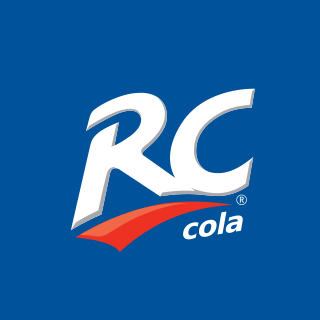
RC Cola is a cola-flavored carbonated beverage owned in the United States by Keurig Dr Pepper and internationally by RC Global Beverages, Inc.

Red Bull is a brand of energy drinks created and owned by the Austrian company Red Bull GmbH. With a market share of 43%, it is the most popular energy drink brand as of 2020, and the third most valuable soft drink brand, behind Coca-Cola and Pepsi. Sinсe its launch in 1987, more than 100 billion cans of Red Bull have been sold worldwide, including over 12 billion in 2023.
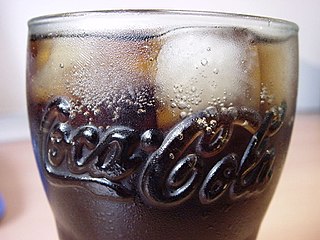
The Coca-Cola Company's formula for Coca-Cola syrup, which bottlers combine with carbonated water to create the company's flagship cola soft drink, is a closely guarded trade secret. Company founder Asa Candler initiated the veil of secrecy that surrounds the formula in 1891 as a publicity, marketing, and intellectual property protection strategy. While several recipes, each purporting to be the authentic formula, have been published, the company maintains that the actual formula remains a secret, known only to a very few select employees.
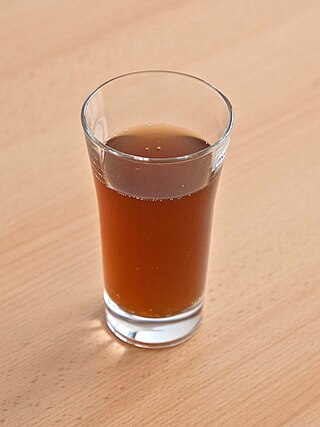
OpenCola is a brand of open-source cola whose list of ingredients and preparation instructions are freely available and modifiable. Anybody can make the drink, and anyone can modify and improve on the recipe. It was launched in 2001 by free software P2P company Opencola, to promote their company.

Cream soda is a sweet soft drink. Generally flavored with vanilla and based on the taste of an ice cream float, a wide range of variations can be found worldwide.

Spezi is the brand name for a soft drink owned by Brauhaus Riegele in Augsburg, Germany. Spezi is a genericized trademark and the name is used as a generic term for a mixture of cola and orange soda (orangeade) in most German-speaking countries.

Sun Drop is a citrus-flavored soft drink produced by Keurig Dr Pepper with a yellowish-green color. Among soft drinks, it is known for its high caffeine content. Orange juice is an ingredient in the drink, and remaining pulp matter from the orange juice provides some of the soft drink's taste and appearance. Sun Drop competes primarily against the Coca-Cola Company's Mello Yello and PepsiCo's Mountain Dew.
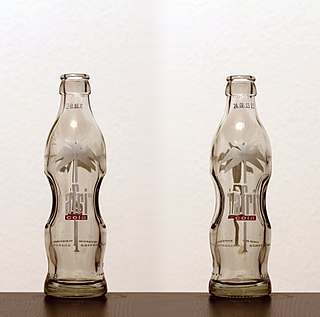
Afri Cola is a cola soft drink produced in Germany. The trademark Afri-Cola was registered in 1931 by the company F. Blumhoffer Nachfolger GmbH. The same company also produced Bluna, an orange soft drink. Today the brand belongs to the Mineralbrunnen Überkingen-Teinach AG. Afri Cola was once one of the most popular cola brands in Germany, but has lost considerable market share since the 1960s.
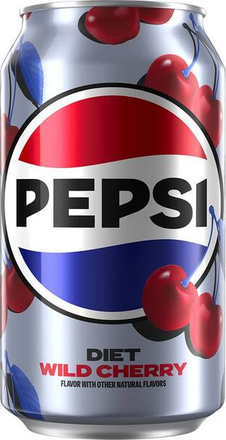
Pepsi Wild Cherry is a cherry-flavored cola first introduced in 1988 by PepsiCo. Two sugar-free versions are also available, with zero calories, named Diet Pepsi Wild Cherry and Pepsi Zero Sugar Wild Cherry, and a vanilla-flavored version Pepsi Cherry Vanilla is also available. Alongside the beverages, a lip balm version is also available. Pepsi Wild Cherry is currently sold in the United States and Canada as a regular, permanent product.

Rivella is a soft drink from Switzerland, created by Robert Barth in 1952, which is produced from milk whey, and therefore includes ingredients such as lactose, lactic acid and minerals. Other than Switzerland, it is sold in several other countries, notably the Netherlands, and is available in several varieties depending on the country.

Vita Cola is a cola beverage produced in Germany. Vita Cola's flavor is described as cola-like with a strong note of lemon and fruit flavoring. It is also noticeably less sweet than Afri-Cola, Coca-Cola or Pepsi, and has a slightly thicker consistency due to its use of citrus and other aromatic oils in the formula. Vitasoy also produces a cola beverage branded as Vita Cola.

Pepsi Zero Sugar, is a zero-calorie, sugar-free, formerly ginseng-infused cola sweetened with aspartame and acesulfame K, marketed by PepsiCo. It originally contained nearly twice the caffeine of Pepsi's other cola beverages. Before a recipe change in late 2022, Pepsi Zero Sugar contained 69 milligrams of caffeine per 355 mL (12.5 imp fl oz), versus 36 milligrams in Diet Pepsi.

Club-Mate is a caffeinated carbonated mate-extract beverage made by the Loscher Brewery in Münchsteinach, Germany, which originated in 1924. Club-Mate has 20 mg of caffeine per 100 ml, sugar content of 5 g per 100 ml, and 20 kcal per 100 ml, which is lower than most energy drinks. Club-Mate is available in 0.33-litre and 0.5-litre bottles.

Sprite is a clear, lemon-lime flavored soft drink created by the Coca-Cola Company. Sprite comes in multiple flavors, including cranberry, cherry, grape, orange, tropical, ginger, and vanilla. Ice, peach, Berryclear remix, and newer versions of the drinks are artificially sweetened. Sprite was created to compete primarily against 7-Up.
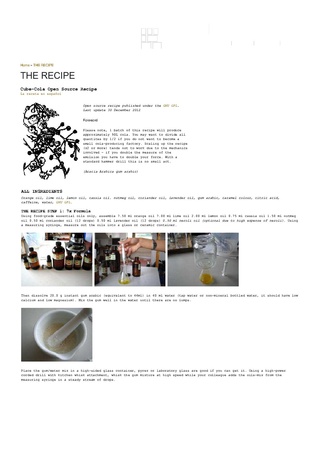
Open-source cola is any cola soft drink produced according to a published and shareable recipe. Unlike the secretive Coca-Cola formula, the recipes are openly published and their re-use is encouraged. The texts of OpenCola and Cube-Cola recipes are published under the GNU General Public License (GPL).

Coca-Cola Life was a reduced-calorie version of Coca-Cola introduced in 2013, using a combination of stevia and sugar as sweeteners. It was first released in Argentina and Chile after five years of research together in these countries. The formulation varied by market location, and in some areas the original formulation had been phased out in favor of a zero-calorie version sweetened with stevia only. The drink was discontinued in 2020 as part of the Coca-Cola Company discontinuing underperforming brands.
















